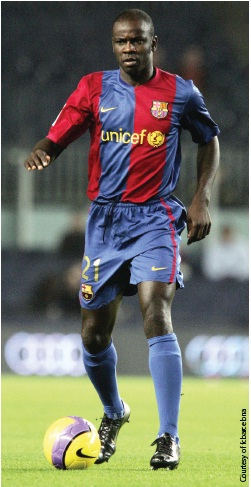Not for Thuram who reflects on the positive
While the Japanese public may long bask in the memory of Barcelona’s December visit to Yokohama, the Catalan giants are in a hurry to forget.
Barcelona, champions of European football, arrived in Japan last month to participate in the FIFA Club World Cup, a competition for each continent’s club champions to compete for the bragging rights of the world’s official number one title.
More an idealistic romanticisation of football’s global parity than a serious test for the European big boys, Barca were expected to carry off their first world crown at a canter.
But a late mugging by Brazil’s Internacional in the final halted their procession, and left the Spanish side cursing their fruitless and laborious trek around the world in the middle of a busy European season.
Not everyone at the club saw the trip to Japan as a wasted journey, however.
Defender Lilian Thuram joined Barcelona last summer after 10 hugely successful years in Italy with Parma and Juventus, having just lost to the Italians in the 2006 World Cup Final with his national side, France.
Not everyone at the club saw
the trip to Japan as a wasted
journey, however.
Thuram, a World Cup winner in 1998, is widely acknowledged as one of the game’s most intelligent players, earning himself the nickname “Le Professeur” from his admiring colleagues. A man with many interests away from football, Thuram can appreciate the benefits of taking the time to visit foreign cultures. “I remember the Cameroon player Patrick Mboma played club football here in Japan,” he says. “After he came back to Europe we played together at Parma. He said the life in Japan was very good, and he enjoyed his time here… The life is more interesting for a stranger because it is a new culture. It is very important to understand other cultures and the way people live.”
Age and experience have afforded Thuram an understanding of the wider picture, but he admits it has not always been thus.
Arsene Wenger, Thuram’s manager at former club Monaco, left the French side to coach Nagoya Grampus Eight in the fledgling J. League in 1995, shortly after winning the European Cup Winners Cup.
It is more important for someone to take
everything from a new culture, not just
football. After he had been in Japan he
became a better coach because of it.
Thuram admits the decision to leave such rarified surroundings for the obscurity of Japanese football left him puzzled. “It was a surprise when Mr Wenger left to go to Japan,” he says. “He is a very good coach, and when he came here it was strange for French people. We didn’t know anything about Japanese football.”
But for Thuram, the reasons soon became apparent.
Wenger moved to England after a successful stay in Japan to establish himself as one of the world’s leading managers with his club Arsenal, where he still coaches today.
Thuram believes the change in environment gave the coach an edge that his rivals could not match. “Mr Wenger is a very intelligent person, and he came here for the experience,” Thuram says. “It is more important for someone to take everything from a new culture, not just football. After he had been in Japan he became a better coach because of it.”
For his part, Thuram has no plans to follow Wenger’s path east. Now 35 years old, the defender is happy to continue plying his trade on football’s grandest stage, and he admits he is unfamiliar with the strides Japanese football has made. “I know some Japanese players,” he says. “I know Nakamura because he played in Italy, and I know Nakata because he is the most famous of them all. He is a very good player, but I don’t know anything about the Japanese league.”
“Would I come to play here in Japan? No, I don’t think so. I’m too old.”
But while he may not be prepared to move to Japan for the long haul, Thuram believes his club’s December visit, no matter how unrewarding it ultimately proved for the team, provided a valuable experience for the Japanese public. “The Japanese fans are very good,” he says. “I have been here before with Juventus, and every time I come it is good. It is important to see these teams, because the fans only get a chance to see them on TV… It is probably the only time in their lives they will get the opportunity to see Ronaldinho or Deco, so they are happy.”
For more information on Lilian Thuram and the stars at FC Barcelona see: www.fcbarcelona.com. To keep up-to-date with world soccer see: www.uefa.com.









